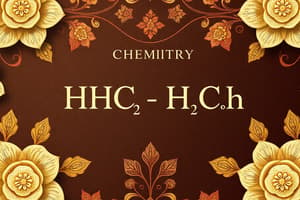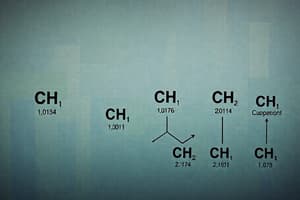Podcast
Questions and Answers
What is a chemical formula?
What is a chemical formula?
- An electronegative molecule.
- Written combinations of elements and numbers. (correct)
- A compound composed of only two elements.
- A type of ion.
What is an ion?
What is an ion?
An electrically charged atom or molecule.
Define a polyatomic ion.
Define a polyatomic ion.
A molecule composed of more than one element with a positive or negative charge.
What is a cation?
What is a cation?
What is an anion?
What is an anion?
What is oxidation state?
What is oxidation state?
What are binary compounds?
What are binary compounds?
Describe type I binary compounds.
Describe type I binary compounds.
What are type II binary compounds?
What are type II binary compounds?
What does 'deca' signify in chemistry?
What does 'deca' signify in chemistry?
What does 'mono' mean?
What does 'mono' mean?
What is the meaning of 'di'?
What is the meaning of 'di'?
What does 'tri' represent?
What does 'tri' represent?
What is the meaning of 'tetra'?
What is the meaning of 'tetra'?
What does 'penta' indicate?
What does 'penta' indicate?
What does 'hexa' mean?
What does 'hexa' mean?
What does 'hepta' signify?
What does 'hepta' signify?
What does 'octa' mean?
What does 'octa' mean?
What does 'nona' indicate?
What does 'nona' indicate?
What is meant by non-electronegative elements?
What is meant by non-electronegative elements?
What are very electronegative elements?
What are very electronegative elements?
What is ammonium's chemical formula?
What is ammonium's chemical formula?
What is the formula for acetate?
What is the formula for acetate?
What is the chemical formula for carbonate?
What is the chemical formula for carbonate?
What does hydrogen carbonate refer to?
What does hydrogen carbonate refer to?
What is the formula for chromate?
What is the formula for chromate?
What is the chemical structure of cyanide?
What is the chemical structure of cyanide?
What is the formula for hypochlorite?
What is the formula for hypochlorite?
What is chlorite's chemical structure?
What is chlorite's chemical structure?
What does chlorate refer to?
What does chlorate refer to?
What is the chemical formula for perchlorate?
What is the chemical formula for perchlorate?
What is the formula for dihydrogen phosphate?
What is the formula for dihydrogen phosphate?
What is the structure of hydroxide?
What is the structure of hydroxide?
What is nitrate's chemical formula?
What is nitrate's chemical formula?
What is phosphite's structure?
What is phosphite's structure?
What is the chemical formula for phosphate?
What is the chemical formula for phosphate?
What is the formula for sulfite?
What is the formula for sulfite?
What is sulfate's chemical structure?
What is sulfate's chemical structure?
Flashcards are hidden until you start studying
Study Notes
Chemical Formula
- Represents combinations of element symbols, numbers, and punctuation indicating element amounts in chemical compounds (e.g., H2).
Ion
- An electrically charged atom or molecule resulting from an imbalance in the number of electrons and protons (e.g., Na+, Cl-).
Polyatomic Ion
- A molecule made of multiple elements that carries a positive or negative charge (e.g., SO4 -2).
Cation
- An ion with more protons than electrons, typically positively charged (e.g., Na+).
Anion
- An ion with more electrons than protons, resulting in a negative charge (e.g., Cl-).
Oxidation State
- Indicates the number of electrons removed to form a cation, also referred to as charge or oxidation number.
Binary Compounds
- Compounds consisting of only two elements, which can be ionic or covalent (e.g., NaCl, H2O, PCl3).
Type I Binary Compounds
- Ionic compounds with metals that exhibit only one oxidation state, named using the format metal nonmetal root + ide (e.g., Ca2+).
Type II Binary Compounds
- Ionic compounds with metals that can have multiple oxidation states; named with (oxidation #) nonmetal root + ide (e.g., transition metals).
Binary Covalent Compounds
- Compounds formed between two nonmetals, named using prefixes for quantity and nonmetal root + ide.
Numerical Prefixes for Nomenclature
- Deca: 10
- Mono: 1
- Di: 2
- Tri: 3
- Tetra: 4
- Penta: 5
- Hexa: 6
- Hepta: 7
- Octa: 8
- Nona: 9
Electronegativity
- Non-electronegative elements (e.g., metals) readily give away electrons.
- Very electronegative elements (e.g., nonmetals) tend to acquire electrons.
Important Polyatomic Ions
- Ammonium: NH4 (+1 ion)
- Acetate: C2H3O2 (-1 ion)
- Carbonate: CO3 (-2 ion)
- Hydrogen Carbonate: HCO3 (-1 ion)
- Chromate: CrO4 (-2 ion)
- Cyanide: CN (-1 ion)
- Hypochlorite: ClO (-1 ion)
- Chlorite: ClO2 (-1 ion)
- Chlorate: ClO3 (-1 ion)
- Perchlorate: ClO4 (-1 ion)
- Dihydrogen Phosphate: H2PO4 (-1 ion)
- Hydroxide: OH (-1 ion)
- Nitrate: NO2 (-1 ion)
- Phosphite: PO3 (-3 ion)
- Phosphate: PO4 (-3 ion)
- Sulfite: SO3 (-2 ion)
- Sulfate: SO4 (-2 ion)
Studying That Suits You
Use AI to generate personalized quizzes and flashcards to suit your learning preferences.




